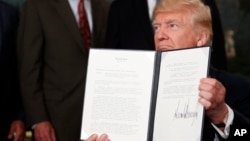China expressed "strong dissatisfaction" on Monday with the U.S. launch of an investigation into China's alleged theft of U.S. intellectual property, calling it "irresponsible."
The U.S. Trade Representative formally announced the investigation on Friday, a widely expected move following a call from President Donald Trump earlier last week to determine whether a probe was needed.
The investigation is the administration's first direct measure against Chinese trade practices, which the White House and U.S. business groups say are damaging American industry.
China's Commerce Ministry said in a statement that the move sent the wrong signal to the world, and would be condemned by the international community.
"The United States' disregard of World Trade Organization rules and use of domestic law to initiate a trade investigation against China is irresponsible, and its criticism of China is not objective," an unnamed ministry spokesman said.
"China expresses strong dissatisfaction with the United States' unilateral protectionist action. We urge the U.S. side to respect the facts, ... respect multilateral principles, and act prudently," the official said, adding that Beijing would take "all appropriate measures, and resolutely defend China's lawful interests."
The United States should instead work with China to find consensus and promote healthy trade relations, the ministry said.
Section 301 of the Trade Act of 1974, a popular trade tool in the 1980s that has been rarely used in the past decade, allows the U.S. president to unilaterally impose tariffs or
other trade restrictions to protect U.S. industries from "unfair trade practices" of foreign countries.
Beijing would almost certainly challenge any such measures at the WTO.
But China's policy of forcing foreign companies to turn over technology to Chinese joint venture partners and failure to crack down on intellectual property theft have been longstanding problems for several U.S. administrations.
Administration officials have said that Chinese theft could amount to as much as $600 million, though Chinese officials deny that such forced technology transfers exist. They say the country is continuously improving intellectual property protection.
The probe will likely further complicate the U.S. relationship with China, the country's largest trading partner.
The Trump administration has been pressing Beijing to take steps to encourage North Korea to curb its nuclear and missile programs.





